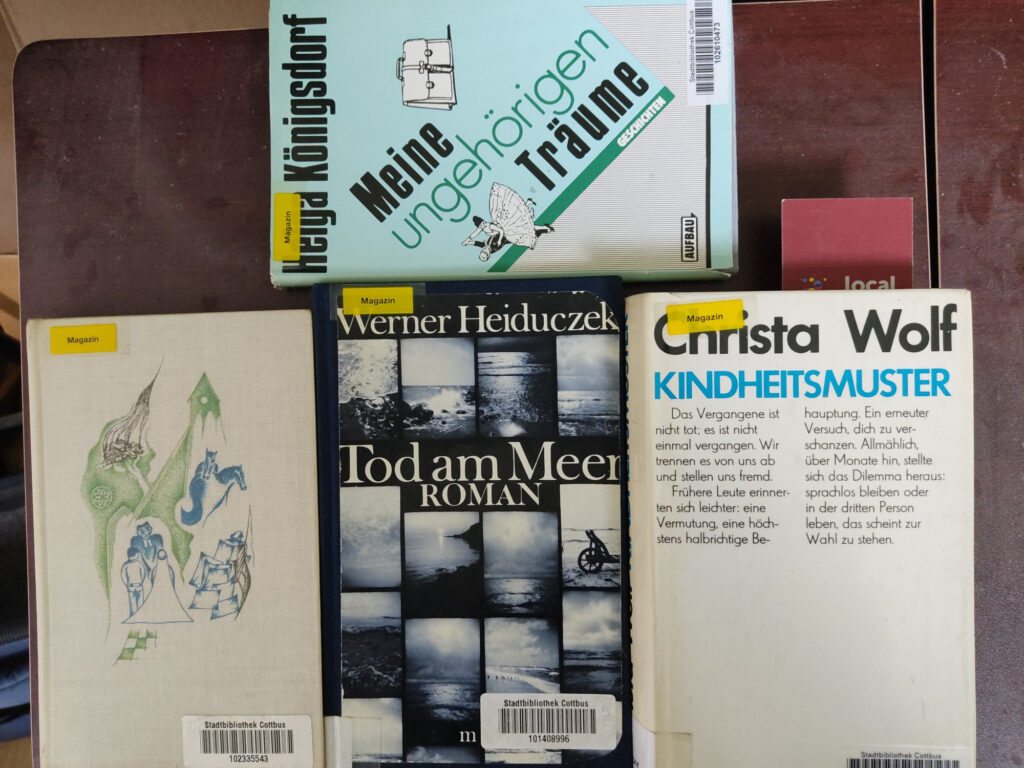I finished a modest seven books this month, mainly because (for the first time) none were in English: one Portuguese, and six German, as part of the month’s DDR theme. (And four of those by women.)
- Leben des Galilei — Bertolt Brecht
- Quinze Dias — Vitor Martins
- Das grüne Licht der Steppen — Brigitte Reimann
- Tod am Meer — Werner Heiduczek
- Meine ungehörigen Träume — Helga Königsdorf
- Das Erdbeben bei Sangerhausen — Helga Schütz
- Kairos — Jenny Erpenbeck

Starting with the odd-one-out, Quinze Dias is a YA novel about a teenager who is fat and gay, and experiences a predictably hard time in small-town Brazil. His hunky neighbour comes to stay with the family for the 15 days of the title, with somewhat predictable results. Despite that, I really enjoyed the book: the narrator has a believable voice, and the characters (especially the protagonist’s mother) are well-drawn.
Brecht was of course a prominent DDR author, though Leben des Galilei dates from his years of exile in the Nazi period. The audiobook was performed by a full cast of actors, generally effectively, though a little was lost by not seeing the demonstrations of which heavenly bodies were revolving around what. The political aspects (truth under autocracy, class differences, etc.) are handled naturally enough not to be overpowering, and Brecht doesn’t shy away from the flaws in Galileo’s character.
Das grüne Licht der Steppen is a record of Reimann’s trip to Siberia as part of a FDJ delegation in 1964. Again, one’s first reaction is to consider the political slant: there’s a lot of breathless admiration of hydroelectric power stations, but it’s genuine enough, and coupled with enough engagement with the people she meets, to take the reader with her. At the end of the book are excepts from her diaries which tell the same story but with some more negative comments, making for an interesting comparison.
Tod am Meer (1977) is one of the main reasons I chose the theme for the month: along with Christa Wolf’s Kindheitsmuster, it’s one of the main focuses of Clemens Meyer’s book on Wolf which I read recently. It’s rather reminiscent of Catch-22 and All Quiet on the Western Front: a picaresque story of the late war/early-DDR years, with a fine balance between humour and horror. Heiduczek wasn’t allowed to publish any adult novels after this, which was clearly a great loss.
I was also intrigued by Meyer’s brief mention of “the Helgas”: I read story collections by two of them (Helga Schubert I read a month or two ago, but Hahnemann and Novak have escaped). The first, Meine ungehörigen Träume, consists mostly of satirical accounts of life in East German academia (Königsdorf was a mathematician as well as a writer); I confess I didn’t finish the title story, which is a collection of dream sequences, but I found the rest gently enjoyable. Das Erdbeben bei Sangerhausen is less gentle that it first seems: the stories are told in fairytale fashion, but are mostly set in the war years, providig a suitably ominous off-stage threat. This is an early work (1972), but Schütz is still alive and writing, and I’d love to read more of her.
The last book is, to mirror the Brecht, not written in the DDR, though it is set in it (and the years immediately following). (There’s also a link to the Brecht play which I won’t spoil here.) I saw a theatre adaptation of Kairos a few months ago, and was very impressed, but the book is much better. Erpenbeck combines a cool, objective voice with access to the thoughts and feelings of both main characters, which creates an incredibly powerful effect in some scenes. I accidentally timed my reading with the book deservedly winning the International Booker prize.
I’ve also been reading Kindheitsmuster, but slowly — it’s a fantastic book, showing how the “present” (early-70s present) narrator investigates and relates to her younger (Nazi-era) self. Fortunately my plan for June is Finishing Off, so I should manage that and possibly Werner Holt (at least part 1).
